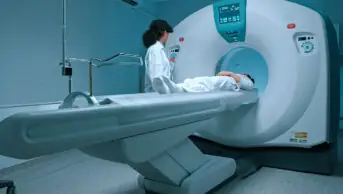
Shutterstock.com
Eighteen people with ‘red-flag’ symptoms for lung cancer were identified during a six-month community pharmacy project designed to help early diagnosis.
The proof-of-concept study, delivered by the North Cancer Alliance — a group of six health boards in northern Scotland designed to improve cancer outcomes — took place across 12 pharmacies in Aberdeen and the NHS Grampian area between June 2022 and September 2023.
The project, funded by NHS Scotland’s Centre for Sustainable Delivery, aimed to identify and support people visiting community pharmacies presenting with or reporting red-flag symptoms for lung cancer, and to subsequently signpost them to access further assessment and diagnosis.
Pharmacists and their teams were trained on how to talk to people with red-flag symptoms, and how to encourage them to seek further help by attending their GP surgery.
Study leaders confirmed that 17 of the 18 people identified received a formal consultation with a pharmacist as part of the pathway process.
Andrew Radley, the executive project lead and consultant in pharmaceutical public health and clinical reader in population health and genomics at the University of Dundee Medical School, said the team worked with GPs to ensure they were able to recognise and support the patients advised to contact them by the pharmacy.
He also pointed out that the education and training needs to deliver the project were “minimal”.
“It is natural for pharmacists to provide this service … it is a small extension to what community pharmacists do every day.”
Radley added that there was a case for extending this type of support, potentially as a national pharmacy service for Scotland, and to include other cancer types.
“In our work with pharmacies, we found that people presented with other symptoms and complaints that pharmacy teams were concerned about, including skin presentations,” he said.
“We are also aware of the ‘CLOCS’ study in ovarian cancer and the potential for pharmacies to be a source of support for these women.”
The findings of the project have been passed onto the Scottish government via NHS Scotland’s Centre for Sustainable Delivery and the team intends to publish the findings.
Commenting on the project, a spokesperson for Community Pharmacy Scotland said: “This study has highlighted the unique and opportunistic position that community pharmacy teams are in to make an impact on Scotland’s rising rates of progressive cancer and health inequalities.
“It has also shown that the skillset which resides within community pharmacy teams is ideally suited for prompt health interventions, whilst keeping patient care at the forefront.
“This study … is just one example of how community pharmacy in Scotland can help to support a more sustainable and cost-effective NHS model. The correct resource must be carefully considered before this could evolve into a national service.”
In England, the ‘NHS supporting early diagnosis of cancer’ project, launched in 2024, enables community pharmacies to refer patients with ‘red flag’ cancer symptoms directly to secondary care or rapid diagnostic services, without the need to visit a GP.
Meanwhile, Cancer Research UK has trained pharmacists working in Tesco supermarkets across England and Wales to discuss possible cancer symptoms with customers and emphasise the importance of early diagnosis.
For a learning article on this topic, visit ‘Identifying patients with suspected cancer: red flags and referral’


